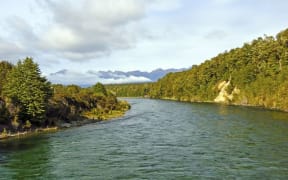The Freshwater Iwi Leaders Group has signed a Memorandum of Understanding with Local Government New Zealand which it says will make local and central government more accountable to Māori.
The group said it signed the agreement, on behalf of the Iwi Chairs Forum, to support and encourage strong relationships and collaboration between councils and iwi.
Freshwater Iwi Advisors chair Roku Mihinui said it took two years for the MOU to come to fruition and it was an exciting development.
"Having the Local Government NZ executive attend a Iwi Chairs Forum meeting to sign an Memorandum of Understanding that looks at how we can work better together to address issues common for iwi, hapū, whānau as well as those councils, but also for the betterment for the wider community, then it's huge, it's pretty significant."
Mr Mihinui said in the past, discussions between the Iwi Leaders Group and the Iwi Chairs Forum highlighted their concerns about the bad treatment they received, mainly from regional councils.
But he said the MOU identified matters of common strategic interest such as economic development, the environment and housing as well as local democratic representation and decision-making.
Mr Mihinui said, at a local level for all of the iwi who were participating in the forum as well as those who were not, the MOU gave them more options.
"This MOU binds the councils to engage with iwi, hapū, whānau, they don't have to be members of the Iwi Chairs Forum.
He said the MOU would effect a number of issues for Māori.
"The proposed regulation changes, particularly around the Resource Management Act and the implications of the proposed reforms at the time for iwi, hapū, whānau and councils to meet its obligations under what they [councils] were calling a 'collaborative approach'.
"We felt that if we work together ourselves and set the template for that it will make it a lot easier, more cost-effective and outcome focused than if those particular criteria were prescribed by central government.
"Too often local government default to the phrase that 'it was the central government that signed the Treaty of Waitangi with Māori therefore they're not obliged under their legislation to have due regard for that or to implement it in a respectful way.
"And that was the biggest frustration and concern iwi who have attended this forum expressed. That was the default position that some councils preferred to go to rather than be proactive to try and resolve the issue."
He said as well as providing more accountability it will allow for a more collaborative approach to problem-solving.
"It gives them the opportunity to avoid serious litigation. The example we gave [at the hui] was the Rotoiti-Rotomā Wastewater scheme in our rohe in Rotorua where the district council was taken to the Environment Court and lost... and also Taniwhā Springs."
He said there would now be better processes, collective leadership and representation of Māori at local government level.
"It's exciting times.
"Based on previous experiences, I don't think iwi chairs were ready to do a haka about it, but we've got a starting point and as long as we're proactive in developing that relationship, then I see for iwi, hapū whānau throughout the country and also the wider community some real wins for us."
Water New Zealand, which represents organisations within the water industry, is praising the development.
Chief executive John Pfahlert said the MOU would help ensure that relevant groups had a seat at the table when local policy was being developed.
"As central government puts increasing responsibility on local and regional councils for managing regional assets like freshwater, it makes perfect sense for councils to be working more closely with important stakeholders like the Freshwater Iwi Leaders.
"This is a positive step and shows that there will be even greater collaboration on a local level around key issues like freshwater management, water infrastructure and other important areas.
"There seems to be a general consensus that the best way forward for some of these issues is through greater transparency between stakeholders to reach mutually acceptable solutions. Memorandums like the one signed today helps formalise this."
Iwi Rights and Interests in Water will be featured at Water New Zealand's upcoming annual conference on 16 September in Hamilton with presentations by representatives from Ngāi Tahu and Tainui.




